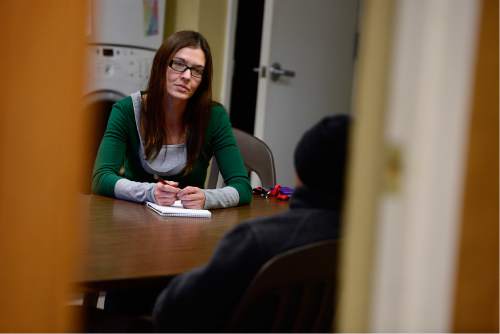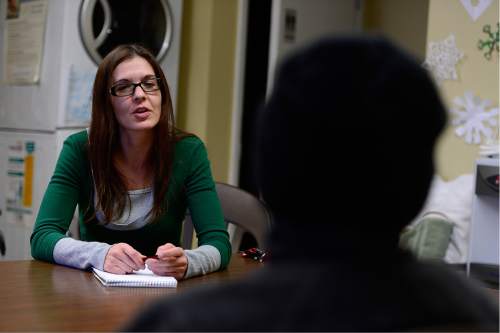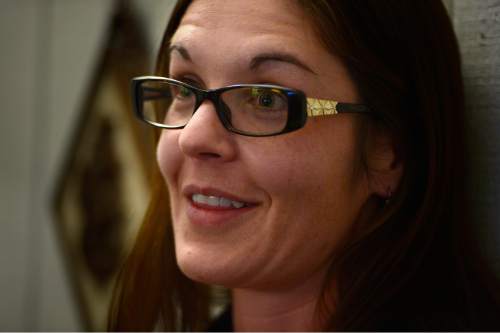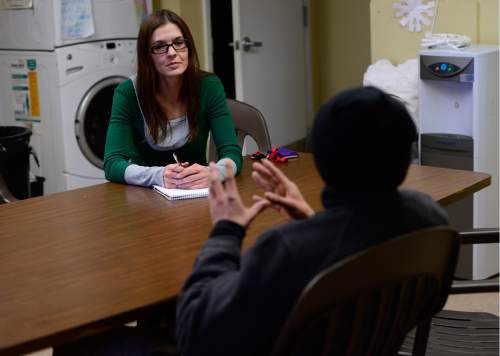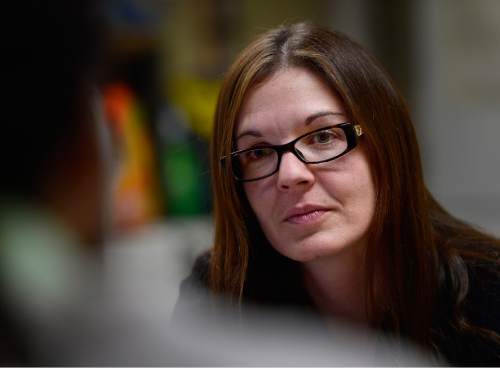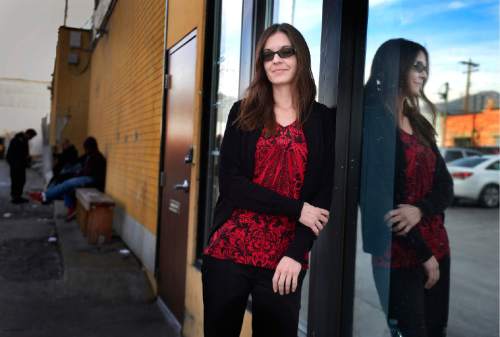This is an archived article that was published on sltrib.com in 2015, and information in the article may be outdated. It is provided only for personal research purposes and may not be reprinted.
There are any number of Grateful Dead lyrics that would apply to Nicole Lowe's teen years as a young vagabond traipsing around the West. But it's hard to conjure any song that would encapsulate her life after that — or her spirit of giving to homeless youths.
Lowe ran away from home at age 13 and lived on the streets for more than three years, hustling drugs, using her share of them, sleeping in parks or wherever, living the life of a free spirit with its ups and downs.
Many stories like hers don't turn out so well. But today, Lowe is a lawyer working in the Utah attorney general's office and has two sons, ages 14 and 18 — and they're both in school.
Twice a week, Lowe volunteers her legal services at the Volunteers of America (VOA) Homeless Youth Resource Center in Salt Lake City. Her clients range from ages 15 to 22 and live on the streets, vulnerable to a host of unknowns.
Young people become homeless for any number of reasons, including violence and even sexual assault. For Lowe, whose parents were often away working, it was something she just fell into.
She recalls drinking alcohol and smoking marijuana at age 13. She would run away for a weekend to party. That soon turned into weeks missing from home. The West Valley City native said by 13 she was living on the streets of Salt Lake City and had taken up with a Gothic group. They dressed in black, wore white face makeup, took drugs and created their own reality.
"We believed in a fantasy world to make ourselves feel important," she said.
Just before she turned 14, Lowe was raped. Seeking security, she took up with a boyfriend 10 years her senior. But at a certain point, he became abusive, she recalled.
She wanted to get away and hooked up with a small group passing through Salt Lake City following the Grateful Dead. They stole a car and drove to San Francisco. The year was 1993. It wasn't long before authorities arrested her friends for auto theft.
—
Legal aid • When most people think of homeless youths, they consider basic needs, such as warm clothing, shoes and a hot meal. What most don't consider, Lowe explained, is that many young people need legal help on all kinds of things, from tickets for loitering, trespassing and even spitting on the sidewalk to criminal charges of theft and drug possession.
They may also need help gaining legal emancipation from abusive guardians. Minors cannot make contractual agreements without it. Minor status acts as a barrier to such things as checking accounts, housing and employment.
Lowe would like to establish a legal clinic for homeless youths that would enlist volunteers from the legal community. According to her plan, she would assess each case and assign a volunteer attorney with expertise in a specific area to meet each client's needs.
She hopes to locate the proposed legal clinic in the VOA's 30-bed homeless youth shelter that is under construction at 888 S. 400 West. But, for now, she holds consultations twice a week at the Homeless Youth Resource Center, where young people also come for clothing, food and toiletries.
Lowe provides a service that goes beyond legal advice, according to Kathy Bray, president and CEO of VOA-Utah.
"A lot of it is providing guidance. We want our youth to receive guidance that will allow them to live in the community as law-abiding citizens," she said. "If they have trouble, she can talk them through it."
Among other things, that means dealing with legal problems, Bray explained. "We can help them take accountability and work them through the system, rather than avoiding it and making it worse. It's a way to steer them in a healthy direction and to be self-sufficient."
—
Homecoming • When Lowe's friends got out of jail in San Francisco, they panhandled for money and hitchhiked around the West. Eugene, Ore., was their preferred location because it wasn't big, like San Francisco or Seattle.
"My fantasy world was crushed in Eugene. We wanted to change the world and open people's eyes to how we are all connected," she recalled. "We took up selling LSD, but it didn't work out too well, because we took more than we sold."
By the winter of 1995, Lowe had drifted to Montana with another boyfriend. On her 17th birthday, she discovered she was pregnant. "Once my son was born and I held him in my arms, I couldn't leave him."
Her boyfriend, by contrast, determined that parenthood was not for him.
"I moved back in with my parents. My dad was not happy with the way my life had gone," Lowe remembered. "But my mom was ecstatic to have me and the baby home because we were safe."
Lowe got a job and took night classes to earn her GED (general educational development diploma). She enrolled at Salt Lake Community College. Eventually, she transferred to the University of Utah, where she received a bachelor's degree in 2002.
"I wanted better for my son. I didn't want him on the street using drugs," she said. "He would have his medical needs met; he would have food and clothing."
Although she had originally planned to be a child clinical psychologist, Lowe took a job as a caseworker for the state Division of Child and Family Services.
"After working with DCFS for three years, I decided to go to law school," Lowe said. "I felt I could help more children and families as a lawyer."
In 2008, she earned a law degree from the U.'s S. J. Quinney College of Law.
Her approach to clients, however, is anything but the TV courtroom image of a hardened lawyer. She comes to her work with sympathy and understanding. And when she's working with homeless youths, she dresses in T-shirts and jeans.
The first challenge in serving young homeless people is to earn their trust, Lowe said. "They've learned not to trust people."
Her experience during her teen years on the road is what drives her to help homeless kids, Lowe said. It provides a special insight that allows her to break down barriers of distrust.
"They are afraid," she said." But they warm up to me fairly quickly."
Volunteers of America
The Salt Lake Tribune will collect donations for Volunteers of America, an organization that helps homeless teens, in the lobby of 90 S. 400 West at The Gateway on Friday, Dec. 18, from noon to 6 p.m. If this doesn't work for you, please contact dara@sltrib.com to make other arrangements.
All donations are tax deductible. The Tribune also will provide a raffle ticket for each donation of $25, with prizes ranging from a behind-the-scenes Utah Jazz adventure, a signed Pat Bagley print, or helping Scott Pierce screen and review a new TV show .
Volunteers of America accepts cash donations but also is looking for the following items (new preferred, but lightly used accepted):
$5 gift cards for fast food places and grocery stores
Coats, rain ponchos, heavy ski gloves, hand warmers
Sleeping bags, tents and tarps
Meals that can be directly eaten from the can (including chili, stew, soup and spaghetti), mac and cheese, granola bars, nonperishable food of all kinds
Toys, games, books and DVDs
Clothing, shoes and backpacks
Toiletries and school supplies
Household items, including blankets and sheets


